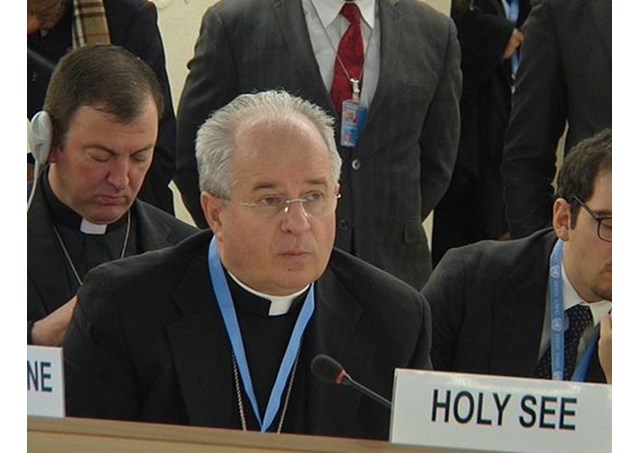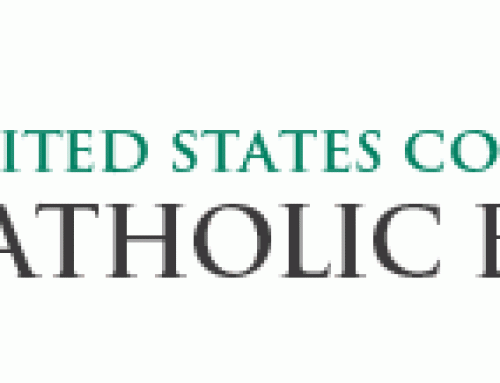Statement by H.E. Archbishop Ivan Jurkovič, Permanent Observer of the Holy See to the United Nations and Other International Organizations in Geneva at the 140th meeting of the Executive Board of the World Health Organization 23 January to 1 February 2017 on Agenda Item 8.2
“Principles for global consensus on the donation and management of blood, blood components and medical products of human origin”
Mr. Chairman,
The delegation of the Holy See notes with interest the proposed principles for ethical consideration in all procedures that involve the donation and management of blood, blood components, and medical products of human origin. Since “neither human life nor the human person can ever be treated as an object to be manipulated or as a disposable commodity,”1 the proposed principles rightfully place concern for the dignity of the donors at the centre of consideration in all matters related to such procedures and call for high ethical standards to protect the health and security of all affected persons.
Equally important is the acknowledgement that many inequities are inherent both in the procurement of, and access to, medical products of human origin. Thus, the proposed framework urges due caution to avoid exploitation of individuals who often lack access to necessary medical products of human origin but might become targets for less than voluntary donations or, worse yet, as potential victims of trafficking in human organs. In this same regard, the Pontifical Academy of Sciences will convene, on 7 and 8 February 2017, in Vatican City a Summit on Organ Trafficking and Transplant Tourism. The objectives of this Summit are to examine the extent of transplant tourism and organ trafficking, and to commit health authorities and other committed persons to work toward the prohibition and eradication of such practices, which were strongly condemned in the World Health Assembly Resolution 63.22.2 In a similar manner, Pope Francis called upon world
- Pope John Paul II, Address to the New Ambassador of the United Kingdom to the Holy See, 7 September 2002, Vatican City, http://w2.vatican.va/content/john-paul-ii/en/speeches/2002/september/documents/hf_jp-ii_spe_20020907_ambassador-great-britain.html
- In that Resolution, the WHO Member States indicated their determination that the growing “utility of human cell, tissue and organ transplantation for a wide range of conditions in low-resource as well as high resource countries” be firmly grounded in the “principles of human dignity and solidarity which condemn
leaders to take “practical and constant, concrete steps and immediate measures for
“putting an end as quickly as possible to the phenomenon of social and economic exclusion, with its baneful consequences” including, inter alia, “ human trafficking, [and] the marketing of human organs and tissues”3
My delegation has taken careful note of the various principles included in the proposal prepared by the Secretariat. Basic consensus on these principles should be forthcoming since they represent traditional values that underpin both medical practice and the very social fabric of our human communities. Indeed, governments should assume the responsibility of promoting and preserving necessary standards to ensure equity in practices related to the donation and procurement of such medical products, confidentiality for all persons involved, protection against physical and psychosocial risks, maintenance of the highest standards of medical care, and effective provision of a reliable supply of needed donations.
Mr. Chairman,
In this regard, the Holy See Delegation is keenly aware of the severe lack of available donations and that, in some cases, only ten per cent of the identified needs can be satisfied. Procedures must be established, however, to guard against the exploitation of vulnerable individuals, to avoid placing an undue burden of donating biological materials on economically disadvantaged groups, or to prevent the logic of the market from gaining the upper hand4 in such critical and complex situations. Perhaps even more important, but not mentioned in the proposed principles, is the need to recognize and promote the “responsibility of love and charity … that commits one to make of their own life a gift to others, if one truly wishes to fulfil oneself.”5
Thank you, Mr, Chairman.
the buying of human body parts for transplantation and the exploitation of the poorest and most vulnerable populations and the human trafficking that result from such practices.”
- Pope Francis, Address to the General Assembly of the United Nations Organization, New York, 25 September 2015, http://w2.vatican.va/content/francesco/en/speeches/2015/september/documents/papa-francesco_20150925_onu-visita.html
- Cf. Pope Benedict XVI, Address to Participants at an International Conference Organized by the Pontifical Academy of Life, Vatican City, 7 November 2008, http://w2.vatican.va/content/benedict-xvi/en/speeches/2008/november/documents/hf_ben-xvi_spe_20081107_acdlife.html
-
Ibid.










